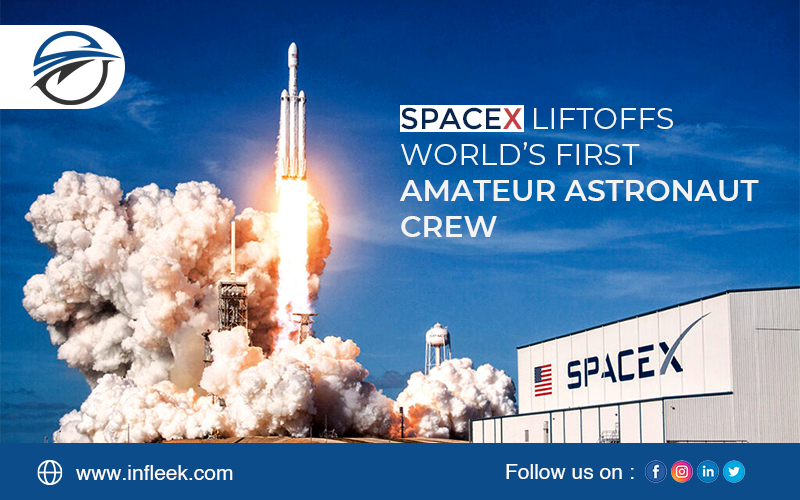This launch imprints the massive development so far in space tourism as Musk’s organization performs the first rented out passenger flight
SpaceX has inaugurated the world’s primary crew of amateur astronauts on a special flight to orbit Earth for 3 days. The successful laugh on Wednesday signified the greatly enterprising leap also in space tourism. It’s the early chartered passenger flight for Elon Musk’s space firm SpaceX and the prime time rocket lined toward a circle with a crew that included no experienced astronauts. Talking about the event from Nasa’s Kennedy Space Center, the director of space, Benji Reed said the same evening that it honestly blows him away.
The Crew Members
- The one who was leading the flight is a 38-year-old Jared Isaacman who earned his success with a payment-processing corporation he began in his teens. Isaacman is the 3rd billionaire to initiate this summer in July , attending flights by Richard Branson’s Virgin Galactic and Blue Origin’s Jeff Bezos.
- Jared is entered by Hayley Arceneaux, a 29-year-old who has been fighting cancer since childhood and works as a physician attendant at Tennessee’s St Jude Children’s Research Hospital in Memphis. Isaacman has committed $100m of his own wealth to the hospital and is striving for another $100m in contributions.
- Furthermore along for the ride are the sweepstakes champions Chris Sembroski, 42-year-old data engineer in Everett, Washington, and Sian Proctor, 51-year-old community college educator in Tempe, Arizona.
- Arceneaux is assigned to come to be the youthful American in space and the first individual in space with a titanium rod in her left leg, a prosthesis.

Duration of the flying
The passengers will use up 3 days circling Earth at a hardly elevated height of 357 miles (575km) – 100 miles (160km) huger than the International Space Station before splashing down off the Florida shore. While Nasa has no part in the procedure, its administrators and astronauts are grounding for aviation, called Inspiration4.
An astronaut Shane Kimbrough who is closing upon the end of his six-month space station visit said that it would be better if more people would be involved whether private or government.
An accomplished pilot, Isaacman enticed SpaceX to carry the Dragon capsule higher than it’s ever been. Originally hesitant because of the raised radiation orientation and other hazards, SpaceX approved after a protection survey.
Isaacman told reporters that now he just wanted them to push them to go higher.
If they’re going to get on to the moon furthermore and they’re going to get on to Mars and beyond, then they’ve got to obtain a little exterior of their comfort zone and make another effort in that direction.
However the capsule is automated, the 4 Dragon riders used up to six months of training for the aviation to withstand any emergency. That coaching comprised centrifuge and trooper jet flights, liftoff and re-entry rehearsal in SpaceX’s capsule simulator, and a grueling trek up to Washington’s Mount Rainier in the snow.
4 hours before launch, the four rose from SpaceX’s big rocket hangar, greeting and blowing kisses to their families and business workers, before they were dispersed to get into their shiny white flight coats. Once at the takeoff pad, they presented for pictures and banged gloved fists, before putting up with the elevator up. Proctor danced as she gave rise to her way to the hatch.
The next trip
Elon Musk’s company SpaceX will have its next private voyage, ahead next year, with a retired Nasa astronaut accompanying three affluent businessmen to the space depot for a weeklong stay. The Russians are embarking an actor, movie director, and a Japanese magnate to the space depot in the following few months. Once defied to space tourism, Nasa is presently a supporter. The change from administration astronauts to non-professionals is barely flabbergasting, explained the retired Nasa official Charles Bolden, a former space shuttle chief.
An engineering professor, Mason Peck from Cornell University, who assisted the chief technologist of Nasa a decade ago has said that someday astronauts of Nasa will be an exception, not the rule. But they’ll be inclined to proceed with being colonists the rest of us will follow.

